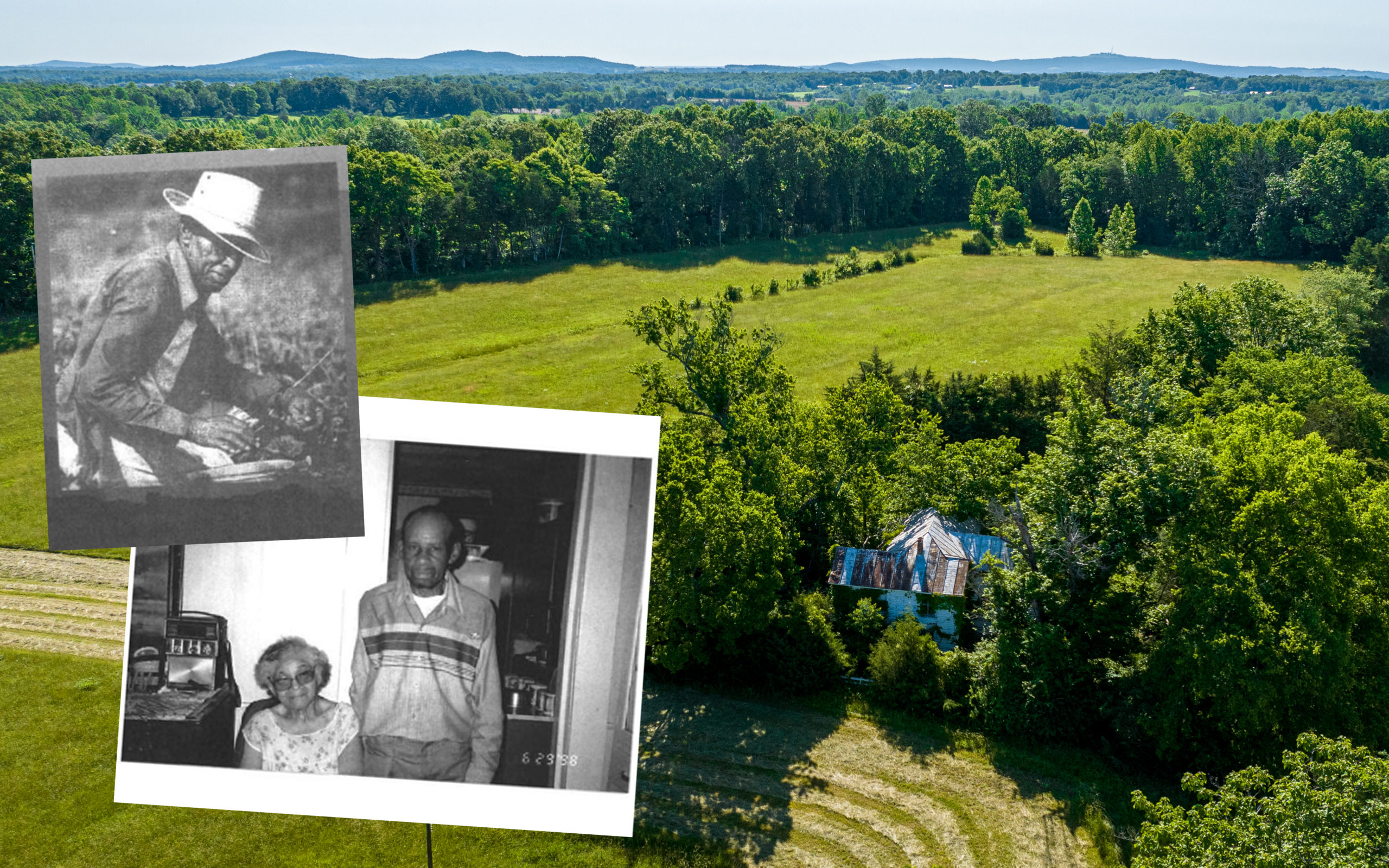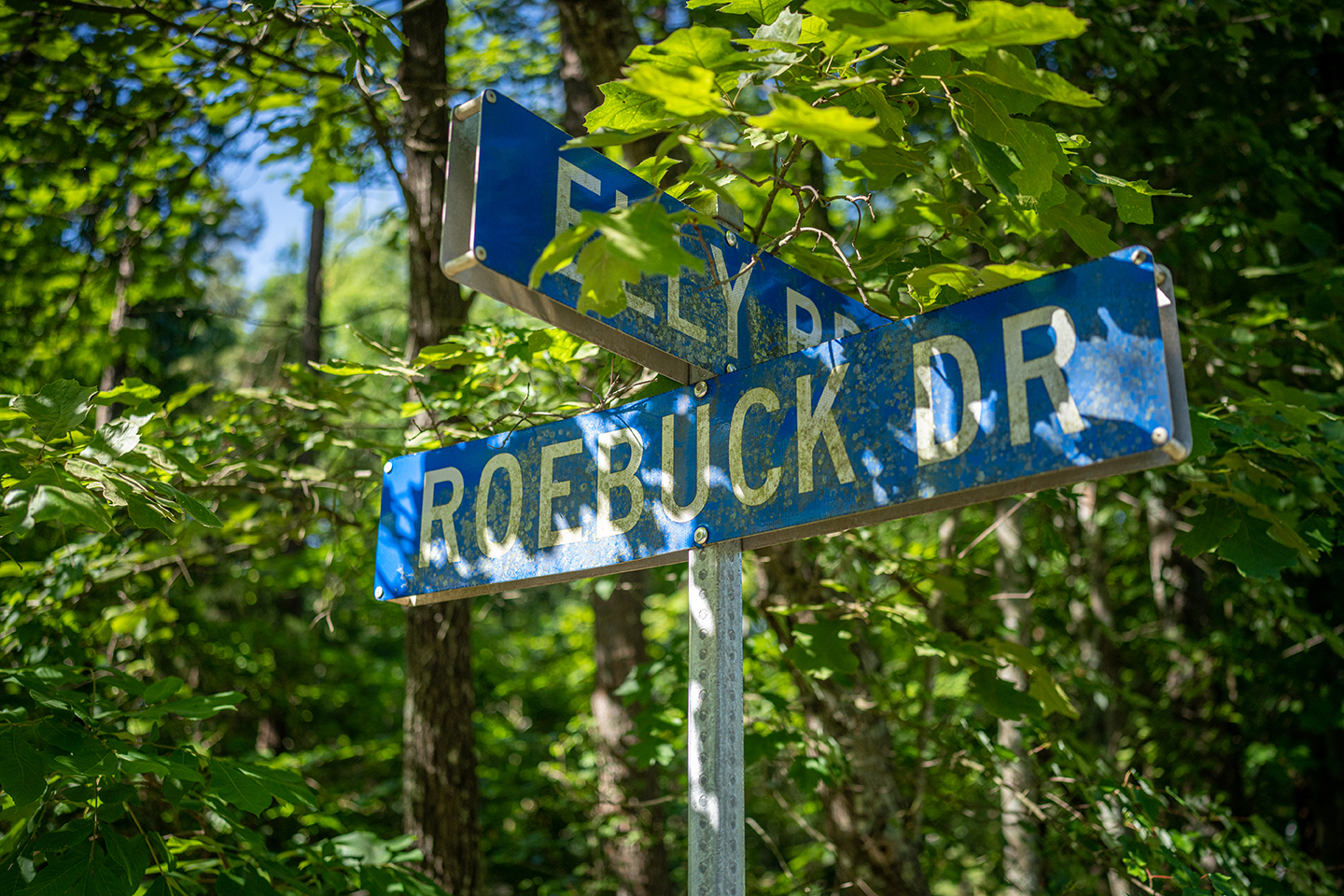
Harry White Roebuck Sr., with wife Virginia (foreground photos), farmed the land that’s been in the Roebuck family for nearly 150 years until Harry was 91 years old.
It’s reasonable that Mike and Tina Roebuck want to hold on to the 112-acre Madison County farm that’s been in the Roebuck family for nearly 150 years. The place holds decades of memories for Mike, who fondly remembers walking the woods and learning to make soap and sassafras tea from his great-grandmother Mary Roebuck. His brother Kenny grew up there and for years helped farm the land with their grandfather Harry Roebuck Sr. “They had 200 head at one time,” Mike remembers, “that’s how they paid the bills.”
But a clause in a Virginia state law contained an unreasonable requirement that nearly cost the Roebucks the farm, quite literally. And when PEC heard about their predicament, our state policy team went to work. “By getting a short clause in Virginia’s land use taxation code changed, we’ve made it easier for families like the Roebucks, whose land is co-owned by many, to keep it all in the family,” said Dan Holmes, then PEC’s state policy director who led the effort.
The beginnings
PEC Historic Preservation Coordinator Kristie Kendall met the Roebucks while documenting historic African American sites along Elly Road in southeast Madison County, to be added to the state’s inventory of cultural resources.
“No one quite knows for sure, but it’s thought that after Emancipation, Noah Roebuck—Mike’s 3rd great-grandfather—opened a shoemaker shop and used skills he developed while enslaved to save up the $646.60 he needed to buy more than 200 acres of land on July 28, 1881,” Kendall said.
Noah’s original log cabin is long gone, but the house his grandson (and Mike’s great- grandfather) George J. Roebuck Sr. built, still (barely) stands today. George’s wife, Mary, was the last person to live there full time, before her passing in 1974. After that, Mike’s Aunt Julia, one of George and Mary’s 10 children, stayed at the home on visits back from Florida, up until about 2008 or 2009. Harry Sr. and Kenny farmed the land until Harry was 91 years old; he died in 2011 at 98. A rose bush marks Noah’s (and his wife, Rody’s) final resting place at the entrance to the Roebuck family cemetery, where every family member buried is known or remembered, personally or by way of oral history.
As was common in those days, Noah gifted or sold some of his land away, and George Roebuck Sr. was the last formally-deeded property owner of the existing 112 acres. From him, the Roebuck land has passed down informally, without a will, to no fewer than 25 of his descendants, including Mike.
As one of many co-owners, Mike received notice in 2016 that the family’s 112 acres was up for auction. “The family members who supposedly were paying taxes on it weren’t, and hadn’t been since 2013. There were a lot of back taxes due,” Tina said.
Mike and Tina were compelled to step in. “This land has been in our family for over 100 years. There is a lot of family history and memories, and for me and my brother a lot of sentimentality. Kenny was raised by our grandparents and farmed every inch of the land with our granddad. We just couldn’t let it go,” Mike said. He and Tina dug deep into their retirement savings, paid the back taxes, and have been paying the full fair-market value taxes ever since. “But with depleted savings and no financial help from other family members, they needed a new avenue for protecting the Roebuck farm.
The trouble with the land use taxation law
Virginia state law allows counties to offer Use Value Taxation programs, commonly referred to as “land use taxation.” These programs tax land at its actual production value—in the Roebuck’s case, agriculture—rather than at its full, fair-market value as real estate. For farmers, whose wealth is typically tied up in land rather than cash, the program can be a real “landsaver,” lowering annual property taxes by a substantial amount. By Mike and Tina’s estimate, land use taxation could lower their tax burden by more than half.
But when they tried to enroll the property in that program, they discovered that language in the Virginia law requires signatures from all known co-owners of the property. That’s where things got complicated.
“In this situation, at some point, a hostile entity had come in and for $25,000 bought two shares of ownership from family members who were in a financial bind. And by refusing to agree to land use taxation, it appears this entity was trying to force a foreclosure on the property, by putting a tax burden on Mike and Tina that was unsustainable,” Holmes said.
“Use valuation was formed so we wouldn’t lose farms to inappropriate taxation. But for this stupid code section, this family would not be struggling, trying to keep up with the tax bill while simultaneously paying the legal bill associated with fending off a hostile outside attempt to gain control over the property,” Holmes said.
Part of PEC’s mission is to advocate for strong state policy that supports working farms and land conservation values. “Once we looked into it, we could see an easy fix, and we felt PEC was best positioned to argue for this legislation based on the fact it played into so many key elements of our mission, including farmland preservation and the rural economy, not to mention being heartbroken by what we saw in this particular case.”

Just a bill on Capitol Hill
After identifying the section of code creating the barrier, PEC’s policy team began championing a change through the legislative process. “It should not be the case where a single landowner, who shares interest in a property that may have as many as 25 or more landowners, should have more power than the rest combined and be able to prevent that family from getting the tax relief it needs to continue use of the land,” Holmes said. “I don’t think our legislature ever foresaw these circumstances or that this would be an outcome.”
“We conceptualized a potential legislative fix—changing the language to ensure that majority interest would rule. We ran our idea through then-Secretary of Forestry and Agriculture Bettina Ring, since hers was the department that oversees the law we were dealing with. Were we missing anything? Did she share our concern about the problem? And she was interested,” Holmes said.
“We had a follow-up conversation with the Secretary and other members of the legislature to go over our proposed language and, given its agricultural tie, handed it off to Delegate Michael Webert for his consideration,” he said.
Webert ultimately filed HB996—Land Use Assessment: Parcels with Multiple Owners—on behalf of PEC. From there, after some tweaks at the House subcommittee level, it received overwhelming bipartisan support both in the House and the Senate before landing on the governor’s desk to be signed. Along the way, PEC staff had boots on the ground in Richmond and elsewhere, promoting the bill, sharing it with partners and others in the conservation community, giving testimony on its behalf.
“The minute people understood the concept of the bill—to ensure people wouldn’t lose their farms due to inap- propriate taxation—and that it affects any person who shares a piece of property with other owners, it sold itself. It was an easy fix to a problem that should never have existed in the first place. And that’s the best kind of legislation to be part of,” Holmes said. “The rural economy is part of our mission, and when you start to lose that industry, we all see the results of what happens to the associated rural land.”
Enhancing heirs’ property protections
HB996 goes into effect on July 1, when Mike and Tina will once again try to enroll the Roebuck farm into Madison’s land use taxation program. “That will give us some relief, at least for a while,” Tina said, referring to the requirement that land use taxation must be renewed every five years. After that, they face other hurdles ahead.
The historical record is replete with stories of involuntary loss of heirs’ property land, stemming from a combination of two main things: unscrupulous others acquiring ownership shares from family members in financial need and forcing these properties to auction, and a process of clearing title so complicated and costly that it frequently exhausts all available resources before reaching conclusion. “But knowing the family history on the land, we can’t not try,” Tina said.
PEC was part of a coalition that supported efforts in the General Assembly in 2020 to pass the Uniform Partition of Heirs Property Act, which ensure that heirs’ property family members get the first opportunity to acquire their historically family-owned land if it must be sold, and that if they can’t, the land be sold at fair market value, rather than auction. Our advocacy for HB996 further enhances protections for heirs’ property owners by requiring just a majority of property owners to sign off on land use taxation.
“It was heartwarming to hear their family story and heartbreaking to hear how the system has failed them because it’s an heirs’ property,” Kendall recalls of her first meeting with the Roebucks. “This was a ‘stop what you’re doing and help’ kind of situation. Of all the work I’ve been doing at PEC, this is one of those stories you never forget,” Kendall said.
This story appeared in The Piedmont Environmental Council’s member newsletter, The Piedmont View. If you’d like to become a PEC member or renew your membership, please visit pecva.org/join.
